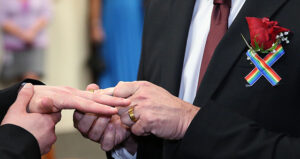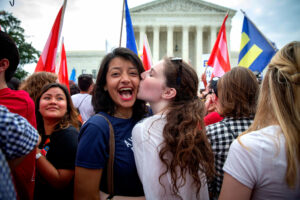Marriage is a sacred bond that celebrates love and commitment between two individuals. For LGBTQ couples, this journey may come with its unique challenges and struggles due to societal attitudes and discrimination. To navigate these obstacles and cultivate a thriving relationship, LGBTQ marriage counseling plays a vital role. In this article, we will explore the significance of LGBTQ marriage counseling, its benefits, how to find counseling services, choose the right counselor, what to expect during sessions, and techniques to nurture a healthy LGBTQ marriage.
Contents
Understanding LGBTQ Marriage

LGBTQ marriages are founded on the same principles of love, trust, and respect as any other marriage. However, societal stigma and discrimination can impose additional stressors on these relationships. LGBTQ individuals may face prejudice, lack of support, and legal barriers that heterosexual couples do not experience. Understanding these unique challenges is crucial for creating an inclusive and empathetic environment within society and the counseling space.
Challenges and Stigma
LGBTQ couples often encounter societal prejudice and discrimination, which can lead to feelings of isolation and low self-esteem. Legal restrictions in some regions can limit their rights and opportunities. Internalized homophobia or transphobia can also create barriers to self-acceptance and hinder relationship dynamics. The weight of these challenges can strain even the strongest relationships, making it essential to seek professional support.
Importance of Counseling
LGBTQ marriage counseling provides a safe and affirming space for couples to explore their thoughts, emotions, and relationship dynamics. It offers an opportunity to address the unique challenges faced by LGBTQ individuals and couples. Through counseling, couples can strengthen their emotional bond, improve communication skills, resolve conflicts constructively, and develop strategies to nurture a healthy and fulfilling relationship.
Benefits of LGBTQ Marriage Counseling

Emotional Support
LGBTQ marriage counseling offers a supportive environment where couples can freely express their emotions without fear of judgment. The counselor acts as a compassionate guide, providing validation and empathy for the couple’s experiences. By fostering emotional support, counseling helps couples build resilience and find solace in each other during challenging times.
Communication Enhancement
Effective communication is the cornerstone of any successful relationship. LGBTQ marriage counseling equips couples with communication tools and techniques tailored to their specific needs. Through active listening, expressing needs and concerns, and learning healthy conflict resolution strategies, couples can enhance their ability to communicate openly and honestly.
Conflict Resolution
Conflicts are a natural part of any relationship. However, LGBTQ marriage counseling assists couples in navigating conflicts productively and respectfully. Couples learn to identify underlying issues, manage disagreements constructively, and negotiate compromises that honor both partners’ needs. This process fosters understanding, builds trust, and strengthens the foundation of the relationship.
Strengthening Bonds
LGBTQ marriage counseling provides a space for couples to rekindle their connection and reignite the spark in their relationship. By exploring shared values, creating shared goals, and engaging in activities that promote bonding, couples can deepen their emotional intimacy and rediscover the joy of being together.
Finding LGBTQ Marriage Counseling Services
When seeking LGBTQ marriage counseling services, it’s important to find a supportive and knowledgeable professional who understands the unique dynamics of LGBTQ relationships. Here are some avenues to explore:
Online Resources: Online directories and platforms can connect couples with LGBTQ-friendly counselors who offer virtual counseling sessions. These services provide convenience and accessibility, particularly for couples living in areas with limited local resources.
Local LGBTQ Centers: Many communities have LGBTQ centers that offer counseling services or can provide referrals to trusted professionals. These centers often have a network of LGBTQ-affirming therapists who specialize in working with same-sex couples.
Referrals from Supportive Networks: Seeking recommendations from friends, LGBTQ support groups, or healthcare providers can lead to finding LGBTQ-friendly marriage counselors. Personal referrals from trusted sources can help ensure a good fit with the counselor.
Choosing the Right LGBTQ Marriage Counselor
Selecting the right LGBTQ marriage counselor is essential for the success of the counseling journey. Consider the following factors when making this decision:
Qualifications and Expertise: Look for a licensed counselor with experience in working with LGBTQ individuals and couples. Specialized training or certifications in couples therapy can also indicate the counselor’s expertise.
Compatibility and Trust: Building a strong rapport with the counselor is crucial for the counseling process. Trust your instincts and choose a counselor with whom both partners feel comfortable opening up and sharing their experiences.
Affordability and Accessibility: Consider your budget and location when selecting a counselor. Some professionals offer sliding scale fees or accept insurance, making counseling more accessible to different financial situations.
What to Expect in LGBTQ Marriage Counseling?

During LGBTQ marriage counseling, couples can expect a personalized and tailored approach to address their specific needs. Here are some aspects to anticipate:
Initial Assessment: The counselor will conduct an initial assessment to understand the couple’s history, current challenges, and goals for counseling. This process helps the counselor tailor the sessions to meet the couple’s unique needs.
Therapeutic Techniques: The counselor will utilize various therapeutic techniques, such as cognitive-behavioral therapy, emotionally focused therapy, or narrative therapy. These approaches aim to promote self-awareness, improve communication, and strengthen the relationship bond.
Confidentiality and Privacy: Counselors follow strict ethical guidelines to ensure client confidentiality and privacy. Couples can share their concerns openly, knowing that the information discussed in sessions will remain confidential.
Nurturing a Healthy LGBTQ Marriage
To nurture a healthy LGBTQ marriage beyond counseling, couples can implement the following practices:
Open Communication: Foster an environment where both partners feel safe to express their thoughts, feelings, and needs. Regularly check in with each other, actively listen, and respond with empathy and respect.
Mutual Respect and Empathy: Cultivate a foundation of mutual respect, acknowledging each other’s individuality and unique experiences. Practice empathy by seeking to understand and validate your partner’s perspective.
Cultivating Intimacy: Prioritize intimate moments that strengthen emotional and physical connection. Engage in activities that bring joy, create shared memories, and promote emotional intimacy.
Conclusion
LGBTQ marriage counseling plays a crucial role in supporting and strengthening the love and connection between same-sex couples. By addressing unique challenges, improving communication, and fostering emotional support, counseling helps LGBTQ couples navigate the complexities of their relationships. Finding a qualified counselor, understanding the counseling process, and nurturing a healthy marriage can empower couples to build a resilient and thriving partnership.
Marriage is a beautiful journey, However, every marriage encounters challenges. If you have any queries regarding Online Marriage Counseling experienced therapists at CoupleMantra can help: Book a trial couple therapy session


